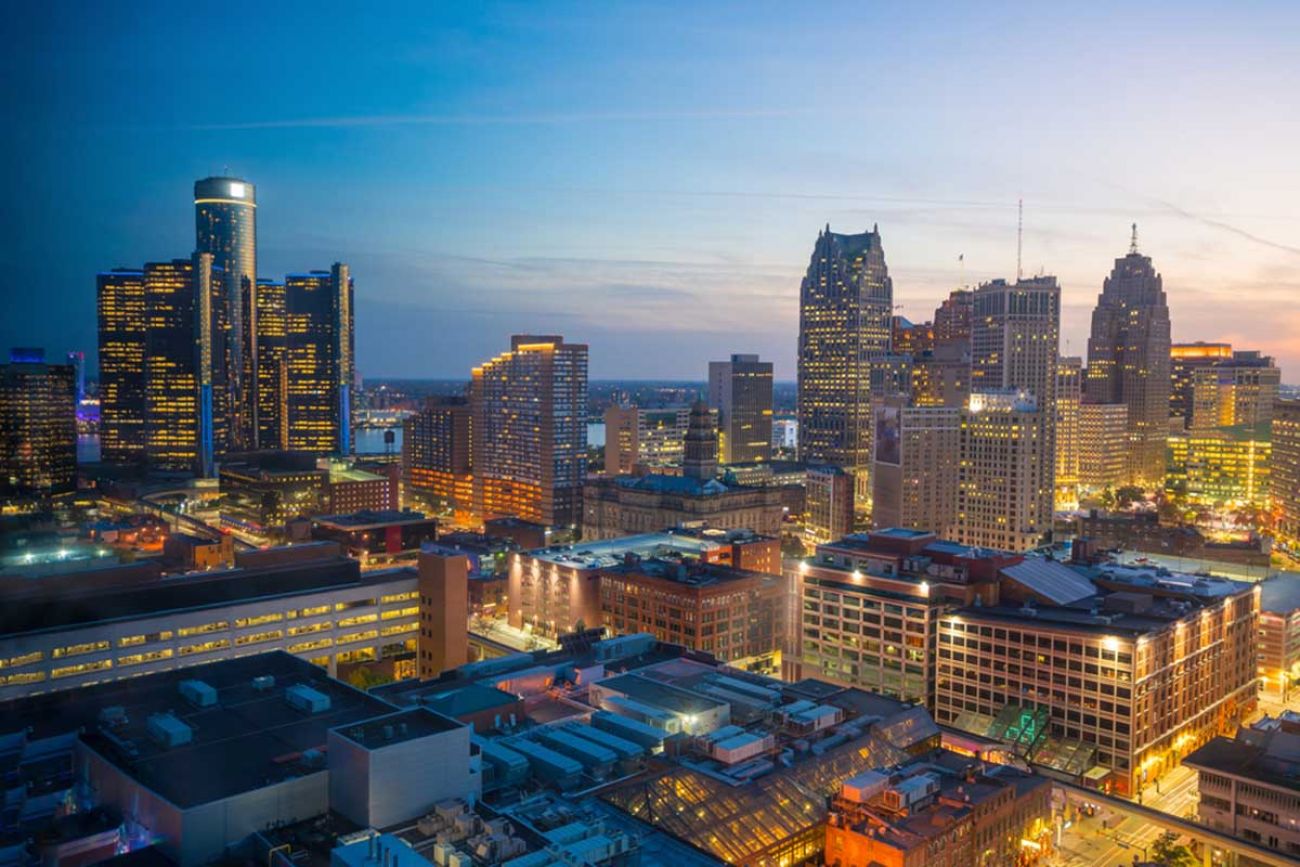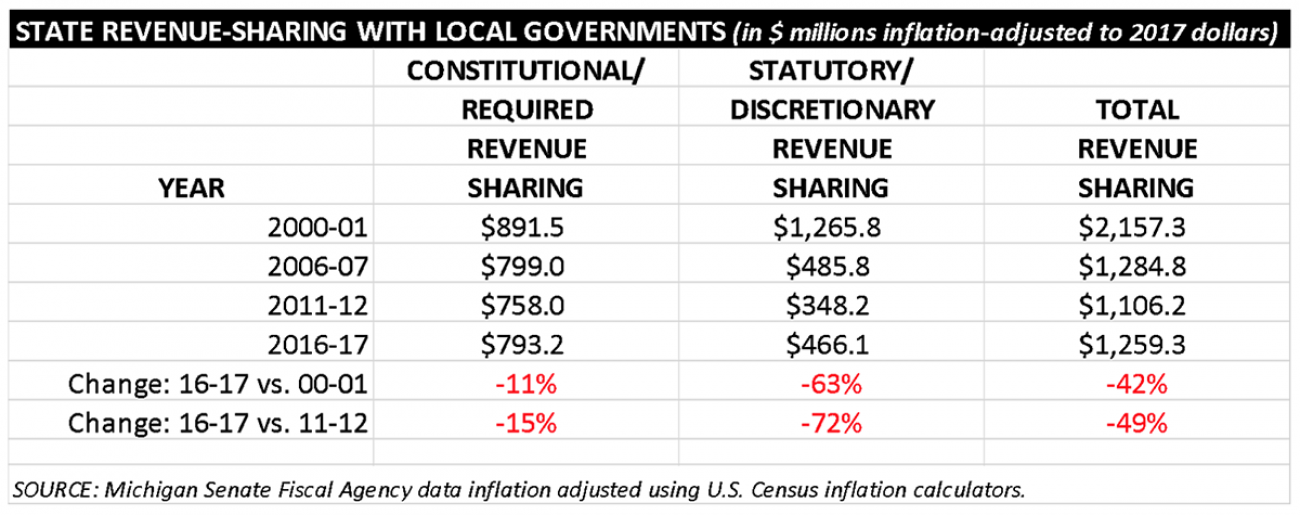In Michigan, more than 150 communities are financially distressed

Michigan is a tale of two kinds of cities.
Cities such as Grand Rapids, Kalamazoo, Traverse City and Ann Arbor have healthy and diverse economies. Other cities - Flint, Saginaw, Jackson, Muskegon, Battle Creek and many smaller municipalities – face deep and long-term financial crisis and depressed local economies. And Detroit, the state’s flagship city, is a complex chowder of economic revival downtown and deeply troubled neighborhoods on the periphery.
Decline in State Revenue Sharing to Cities
Michigan cities are funded in part by tax revenues shared by the state with local governments. Called “revenue sharing,” these payments are partially required by the state constitution and partially “statutory.” The governor and Michigan Legislature have discretion to reduce or increase “statutory” revenue sharing. state revenue . Recent funding results…

The challenge
The number of communities the state considers distressed is long – 138 cities, 36 townships and 15 villages, that run the gamut from Adrian to Ypsilanti. They’re communities with lagging property values, are losing population and have higher-than-average poverty and unemployment rates. That makes them eligible for special state grants, but also underscores the challenges facing many cities.
In Michigan, it’s often a case of have and have-nots among cities. Cities that are doing better, like Ann Arbor, Troy and East Grand Rapids, are those whose property values – the basis of property taxes – have rebounded after the 2008 housing crash. In contrast, Flint lost more than three-quarters of its taxable value from 2008 to 2016. However, the latest Census figures released at end of 2017 showed a one-year median home value increase of 7 percent, outpacing the nationwide average.
Related overage from our 2018 Michigan Issue Guide
- Michigan needs $4B more per year for infrastructure, but how to pay for it?
- Limited Internet in rural Michigan depresses student, business opportunity
- Michigan pays 18% less per citizen than nat'l average for public safety
And inflation-adjusted revenue sharing payments from the state to cities dropped precipitously from Michigan’s economic heyday at the beginning of the 21st century.
Cities have responded by privatizing services and trimming payrolls. Statewide, only 4.2 percent of all workers are employed by state or local governments, the sixth-lowest rate in the country.
But pensions promised to retirees continue to eat at savings. Statewide, Michigan’s total unfunded pension liabilities for local governments is roughly $7.5 billion, in addition to $10 billion in unfunded healthcare liabilities. On average, local pension plans are only 19 percent funded.
The solutions
Legislative remedies, such as a proposal in 2017 to create a Municipal Stability Board to monitor underfunded pension plans, have yet to get off the ground.
Term-limited Gov. Rick Snyder attempted another remedy when he took office in 2011, signing legislation to beef up the state’s emergency manager law. That gave extraordinary power to state-appointed officials to correct the finances of struggling cities from Benton Harbor and Pontiac to Ecorse and Detroit. Critics, though, say the laws suspended democracy and led to the Flint Water Crisis (in which the city’s water was poisoned after an emergency manager switched municipal drinking water systems.)
Last year, the Center for Michigan found that at least 65 percent of residents had “low” or “very low” trust in the state emergency manager system. Legislators, though, have yet to act on the most popular solution – balancing power between managers and locally elected officials.
Civic groups also have unsuccessfully proposed revamping Proposal A, the 1994 constitutional amendment that caps the growth of property taxes – and had the unintended consequence of limiting communities’ tax bases after the real estate crash.
Bright spots
Despite the challenges, cities including Grand Rapids, Marquette, Houghton and college towns like Ann Arbor and East Lansing are enjoying a resurgence. In many cases, it’s because cities have been able to lure younger workers while diversifying employment – such as the downtown and Midtown neighborhoods of Detroit, which is attracting new residents and millions of dollars in investment since the city’s historic 2013 bankruptcy.
Studies show that communities with the best chance of prospering are those with educated workers. By 2025, some 65 percent of jobs will require some education beyond a high school diploma. Statewide, only 40 percent of residents meet that level, so the state is working on a host of programs to attract and train educated workers.
KEEP DIGGING: MORE INFORMATION ON CITIES IN MICHIGAN
- Bridge Magazine: Michigan property values remain dramatically below 2008 levels
- Bridge Magazine: Flint water crisis: Full coverage
- Michigan Municipal League: Proposals to fix municipal finances
- Citizens Research Council: Challenges ahead in balancing the state budget
Explore the Facts & Issues Guide:
At A Glance
Slideshows…
Education & Talent
- K-12 Student Performance: Michigan's K-12 performance dropping at alarming rate
- School Reform: Many Michigan K-12 reform ideas are jumbled, broad, or wildly expensive
- Early Childhood: Michigan preschool funding has improved, but child care still unaffordable
- Higher Ed: College funding cuts in Michigan have led to fewer students, greater debt
Economy & Prosperity
- Economy: Michigan business climate improves, but educated workforce is shrinking
- Jobs & Labor: Demand for Michigan workers is very high, but many have given up looking
- Incomes: Michigan income growth hindered by lack of college graduates
- Business: Business incentives cost Michigan millions, and it’s uncertain they work
Quality of Life
- Public Health: Michigan's adverse health trends track along racal, poverty lines
- Health Care: Health care in rural Michigan communities suffering, despite Obamacare
- Safety Net: $1B of Michigan’s welfare money goes to college students who aren’t poor
- Water Issues: Michigan's Great Lakes are good, but water concerns include lead and Line 5
- Lands & Energy: Michigan battling 22 invasive forest species, high electric bills
- Michigan Tourism: Does state make $8.33 for every $1 spent on Pure Michigan campaign?
- Infrastructure: Michigan needs $4B more per year for infrastructure, but how to pay for it?
- Cities: In Michigan, more than 150 communities are financially distressed
- Rural Michigan: Limited Internet in rural Michigan depresses student, business opportunity
- Public Safety: Michigan pays 18% less per citizen than nat'l average for public safety
Government & Reform
- Michigan Taxes: Michigan gives more tax breaks than it collects for schools, government
- State Spending: Big government? Michigan's state, local workforce 2nd smallest in nation
- Ballot Issues: 2018 Michigan ballot initiatives may decide marijuana, gerrymandering
- Gov't Reform: Despite low trust of gov't, Michigan legislators have done little to change
Who We Are & The Facts on Our Facts
See what new members are saying about why they donated to Bridge Michigan:
- “In order for this information to be accurate and unbiased it must be underwritten by its readers, not by special interests.” - Larry S.
- “Not many other media sources report on the topics Bridge does.” - Susan B.
- “Your journalism is outstanding and rare these days.” - Mark S.
If you want to ensure the future of nonpartisan, nonprofit Michigan journalism, please become a member today. You, too, will be asked why you donated and maybe we'll feature your quote next time!

